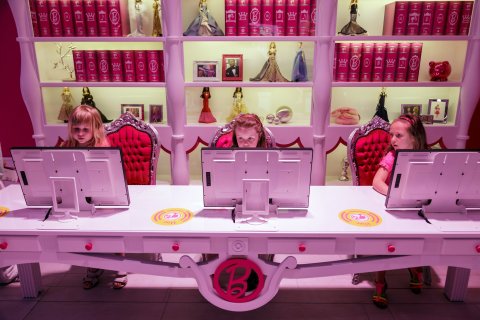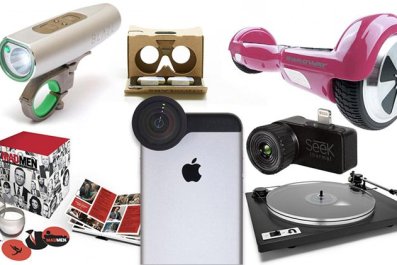In the early 1960s, toymaker Mattel dreamed up Chatty Cathy—a pull-string talking doll that dazzled children with a few simple phrases, like "I love you!" and "Let's play house!" She quickly schmoozed her way onto the holiday gift wish list of a million little girls. In 2015, Mattel is looking to save its struggling, 56-year-old Barbie brand with Chatty Cathy's even chattier cousin, Hello Barbie. Except this doll doesn't just talk; she empathizes and listens—and it's making parents, cybersecurity advocates and child psychiatrists nervous.
It's hard to tell from looking at her, but the latest Barbie is one of the most technologically advanced toys ever made. Her trendy outfit —a cropped metallic jacket and skinny jeans— conceals her electronic innards from her target 6- to 8-year-old demographic. Barbie's stylish necklace cloaks both a microphone and a speaker, enabling her to engage in two-way conversations, tell stories, play games and joke around. Her legs are slightly thicker than those of regular Barbies, to hold two rechargeable batteries, while the small of her back hosts a tiny USB port for charging. To confide in Barbie, all a child must do is press a hold-to-talk button on the doll's belt buckle.
Before the chatting can begin, parents must download a mobile application and connect Barbie to a wireless network. When a child speaks to the doll, a recording of their conversation is transmitted over the Wi-Fi connection to the servers of ToyTalk, a San Francisco–based startup that Mattel partnered with to bring Barbie to life. Speech recognition software converts the audio into text, and artificial intelligence software extracts keywords from the child's responses, triggering Barbie to reply with one of the 8,000 lines handcrafted by a team of writers.
What's more, Barbie remembers every detail, building a cloud database of her owner's likes and dislikes, which she can incorporate into future conversations. If a child tells Barbie that he or she has two mothers, for example, Barbie is equipped to say later on, "What's something really special about your moms? What do you like to do together?" Pretty nifty. But buyers be warned: Barbie doesn't keep secrets.
Keywords plucked from a child's responses to Barbie are funneled into a "trend bucket," showing Mattel and ToyTalk which topics are most popular with their little customers at any given time. The data provides the creators with ideas for how to improve the product for the spring season, such as which lines they should add to Barbie's response repository. So if the company notices a surge of kids mentioning Taylor Swift, Barbie may have some thoughts on the singer-songwriter a few weeks later.
Asked by Newsweek whether the stored material would be used for other purposes, Mattel spokeswoman Michelle Chidoni responds carefully: "We will not use the information to make other product decisions within the Barbie line." That leaves open the possibility of using the data for other toy lines, and, according to ToyTalk's privacy policy, "third-party vendors" can also capitalize on the data for "research and development purposes."
Child privacy advocates don't like what they're hearing. "They really shouldn't call it Hello Barbie; they should call it Surveillance Barbie," Susan Linn, founding director of Campaign for a Commercial-Free Childhood (CCFC), told Newsweek in March. The nonprofit launched a "Hell No Barbie" campaign that month with the hope of shutting down the product. "Kids talking to Hello Barbie aren't just talking to a doll; they're talking to Mattel...a multinational corporation whose only interest in them is financial."
Chidoni says critics have it all wrong. "It's not a surveillance device. There's not a camera in the doll," she says. "And the doll isn't always listening to your conversation; she has to be activated." Besides, she adds, " we are putting all of the data into the hands of the parents."
And indeed, parents can log in to their account and deny ToyTalk access to part or all of what their children say. "If there is something your child says that you don't want on our servers, you hit the trash can, and it is gone in seconds...from all servers," ToyTalk CEO and co-founder Oren Jacob says . "Parents can also delete all and turn off [recordings]." But there is an incentive not to : By granting the company permission to hold on to the information, parents can access audio files of their child's conversations with Barbie. The recordings are carved up into strings of couplets—what Barbie says and the child's response. Parents can play, delete or share the exchange by pushing it to Facebook or Twitter, or by emailing it to Grandma.
While full control may sound like soothing music to parents' ears, it has child psychiatrists worried. "We learn a lot about a child's anger and their family life based on how they play and what is talked about during child's play," says Dr. Judith Fiona Joseph, a child and adolescent psychiatrist with a practice in New York City. "You can learn a lot about what your child observes." Sexual or violent movie scenes, for instance, may make their way into play sessions. "Parents must be very prepared for what they may learn about their children through the recordings," she says.

But the CCFC also fears that hackers—tempted by Barbie's iconic name and massive network—will make some discoveries of their own. Cybercriminals have a fondness for pillaging financial data, but they've also shown they're not averse to stealing what is seemingly less lucrative, like a child's personal information. In late November, hackers ransacked the servers of VTech, a Chinese company that sells a variety of electronic toys, scooping up nearly 5 million parents' names, email addresses, passwords and home addresses, and up to 200,000 kids' first names, genders and birthdays. Worse, the hackers' digital haul contained thousands of pictures of the children and their parents, as well as text and audio chat logs between them.
ToyTalk says it has taken precautions to prevent cyberattacks. It has minimized the collected data to parents' email addresses and a child's chatter, and secured the connections between the doll and servers. The company also ensures that nothing is stored in the doll other than the parents' chosen Wi-Fi networks. "So if a child happens to lose the doll," says ToyTalk's Jacob, "nothing of the child's data is lost at all."
In response to the mounting criticisms, including Barbie's technological vulnerabilities, Chidoni admits that "because she is Barbie, she has a target on her back."
Clearly, Barbie's creators know what they're doing—they've turned their little celebrity into a global toy empire. But that doesn't mean she's immune to controversy. Upon her introduction to the world at the New York Toy Fair in 1959, the unrealistically slim-yet-busty children's toy instantly caught the ire of mothers. "I don't like that influence on my little girl," one mother reportedly said. "It's hard enough to raise a lady these days without undue moral pressures." And as the Barbie brand grew, so did the criticism surrounding it.
In 1992, Mattel gave a voice to an earlier version of Hello Barbie called Teen Talk Barbie, which spoke whenever someone pushed a button on the back of her neck. Lines like "Will we ever have enough clothes?" and "I love shopping!" irked feminists, but "Math class is tough" enraged the American Association of University Women. " Preteen girls most likely to play with Teen Talk Barbie are at the highest risk for losing confidence in their math ability," then–AAUW President Sharon Schuster announced . The organization demanded that Mattel recall the doll. The company deleted the offensive clips and apologized.
This time, Mattel is confident that Barbie is a positive influence. "The value that Mattel and ToyTalk have put on what comes out of Barbie's mouth is insane," says Chidoni. "It doesn't mean that we aren't going to make a mistake, but it does mean that we are doing everything possible that we can to ensure that...we've thought of every possible angle."
How did Mattel respond to the latest security and well-being concerns? " We didn't change anything," says Chidoni, "because there was nothing that needed to be changed."
Parents who are already in the habit of recording their children doing "the darndest things" and sharing it on social media may agree. To them, Hello Barbie's technology may blend in with the Siris and Cortanas already in their lives. But child psychiatrists Newsweek interviewed predict that many parents won't tell their children about the doll's recording capabilities to ensure authentic responses. Parents who do so, the psychiatrists warn, have no idea what they are in for.
Dr. Kevin Kalikow, a child and adolescent psychiatrist in New York City, says that if or when children discover their parents' Barbie betrayal, the results will not be pretty in pink. The immediate effect may be resentment, he says, especially if a secret is made public. There may also be a kind of chilling effect, he says: Children may begin to self-censor, bottling their thoughts as they learn that Mommy or Daddy may share online whatever they tell their doll. If a child learns that everything may inevitably become public, says Kalikow, it may have a "pervasive influence on how the child sees the world."






















